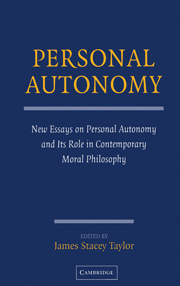Book contents
- Frontmatter
- Contents
- List of Contributors
- Acknowledgments
- Introduction
- PART I THEORETICAL APPROACHES TO PERSONAL AUTONOMY
- PART II AUTONOMY, FREEDOM, AND MORAL RESPONSIBILITY
- PART III THE EXPANDING ROLE OF PERSONAL AUTONOMY
- 12 Procedural Autonomy and Liberal Legitimacy
- 13 The Concept of Autonomy in Bioethics: An Unwarranted Fall from Grace
- 14 Who Deserves Autonomy, and Whose Autonomy Deserves Respect?
- 15 Autonomy, Diminished Life, and the Threshold for Use
- Index
13 - The Concept of Autonomy in Bioethics: An Unwarranted Fall from Grace
Published online by Cambridge University Press: 03 December 2009
- Frontmatter
- Contents
- List of Contributors
- Acknowledgments
- Introduction
- PART I THEORETICAL APPROACHES TO PERSONAL AUTONOMY
- PART II AUTONOMY, FREEDOM, AND MORAL RESPONSIBILITY
- PART III THE EXPANDING ROLE OF PERSONAL AUTONOMY
- 12 Procedural Autonomy and Liberal Legitimacy
- 13 The Concept of Autonomy in Bioethics: An Unwarranted Fall from Grace
- 14 Who Deserves Autonomy, and Whose Autonomy Deserves Respect?
- 15 Autonomy, Diminished Life, and the Threshold for Use
- Index
Summary
Despite its foundational role in the development of the field of bioethics, the concept of autonomy has recently come under attack from a variety of nonliberal perspectives in bioethics, particularly communitarian, feminist, and “family-based decision-making” perspectives. The attack on the concept of autonomy usually centers on one (or both) of two related criticisms: first, that the concept of autonomy is too narrowly “atomistic,” ignoring the social context of personal identity; and second, that a narrow concern with a patient's autonomy rights neglects the social dimensions of healthcare treatment decision making (in particular, the impact of healthcare treatment decisions on a patient's community or family).
Communitarians, for example, argue that the idea of “self ” that has developed since Kant is one that views the self as cut off from others, lacking in its appreciation of the social dimensions of identity. Mark Kuczewski, for example, writes, “The Communitarian view of the person sees the self as constituted by social roles, communal practices, and shared deliberative exchanges.” Similarly, feminist writers from Carol Gilligan to Virginia Held have argued that the dominant understanding of “self ” is Based in autonomy and furthermore is a masculine conception, while feminine paradigms emphasize relationships. Susan Wolf describes this feminist critique of contemporary bioethics as related to the grounding of contemporary bioethics in liberal individualism: Feminism, states Wolf, often views liberal individualism as impoverished, encouraging disregard of relational bonds. Thus, states Wolf, “[T]here is some overlap between non-feminist communitarian critiques of autonomy in bioethics and feminist cautions against mistaking autonomy's sufficiency.”
- Type
- Chapter
- Information
- Personal AutonomyNew Essays on Personal Autonomy and its Role in Contemporary Moral Philosophy, pp. 299 - 309Publisher: Cambridge University PressPrint publication year: 2005
- 14
- Cited by

